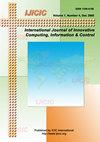New Proposed Mixed Transforms: CAW and FAW and Their Application in Medical Image Classification
IF 1.1
Q4 COMPUTER SCIENCE, ARTIFICIAL INTELLIGENCE
International Journal of Innovative Computing Information and Control
Pub Date : 2023-09-13
DOI:10.11113/ijic.v13n1-2.414
引用次数: 0
Abstract
The transformation model plays a vital role in medical image processing. This paper proposed new two Mixed Transforms models that are the hybrid combination of linear and nonlinear Transformations techniques. The first mixed transform is computed in three steps: calculate 2D discrete cosine transform (DCT) of the image, and applying Arnold Transform (AT) on the DCT coefficients, and applying the discrete Wavelet Transform (DWT) on the result to get which was abbreviated as (CAW). The second mixed transform consists of firstly computing the discrete Fourier transform (DFT), net applying the Arnold Transform (AT), and finally, the computation of discrete Wavelet Transform (DWT) which was abbreviated as (FAW). These transforms have superior directional representations as compared to other multiresolution representations such as DWT or DCT and work as non-adaptive mixed transformations for multi-scale object analysis. Due to their relationship to the wavelet idea, they are finding increasing use in areas like image processing and scientific computing. These transforms are tested in medical image classification task and their performances are compared with that of the traditional transforms. CAW and FAW transforms are used in the feature extraction stage of a classification VGG16 deep learning (DNN) task of Tumor MRI medical image. The numerical findings favor CAW and FAW over the wavelet transform for estimating and classifying pictures. From the results obtained it was shown that the CAW and FAW transform gave e much higher classification rate than that achieved with the traditional transforms, namely DCT, DFT and DWT. Furthermore, this combination leads to a family of directional and multi-transformation bases for image processing.新的混合变换:CAW和FAW及其在医学图像分类中的应用
变换模型在医学图像处理中起着至关重要的作用。本文提出了两种新的混合变换模型,它们是线性和非线性变换技术的混合结合。第一个混合变换分三步计算:计算图像的二维离散余弦变换(DCT),对DCT系数进行阿诺德变换(AT),对结果进行离散小波变换(DWT),得到(CAW)。第二次混合变换包括首先计算离散傅里叶变换(DFT),然后应用阿诺德变换(AT),最后计算离散小波变换(DWT),简称为FAW。与其他多分辨率表示(如DWT或DCT)相比,这些转换具有优越的方向表示,并且可以作为多尺度对象分析的非自适应混合转换。由于它们与小波思想的关系,它们在图像处理和科学计算等领域的应用越来越广泛。在医学图像分类任务中对这些变换进行了测试,并与传统变换的性能进行了比较。在肿瘤MRI医学图像的分类VGG16深度学习(DNN)任务中,将CAW和FAW变换用于特征提取阶段。数值结果表明,相对于小波变换,CAW和FAW更适合用于图像估计和分类。结果表明,CAW和FAW变换的分类率明显高于传统的DCT、DFT和DWT变换。此外,这种组合还形成了一系列用于图像处理的定向和多变换基。
本文章由计算机程序翻译,如有差异,请以英文原文为准。
求助全文
约1分钟内获得全文
求助全文
来源期刊
CiteScore
3.20
自引率
20.00%
发文量
0
审稿时长
4.3 months
期刊介绍:
The primary aim of the International Journal of Innovative Computing, Information and Control (IJICIC) is to publish high-quality papers of new developments and trends, novel techniques and approaches, innovative methodologies and technologies on the theory and applications of intelligent systems, information and control. The IJICIC is a peer-reviewed English language journal and is published bimonthly

 求助内容:
求助内容: 应助结果提醒方式:
应助结果提醒方式:


